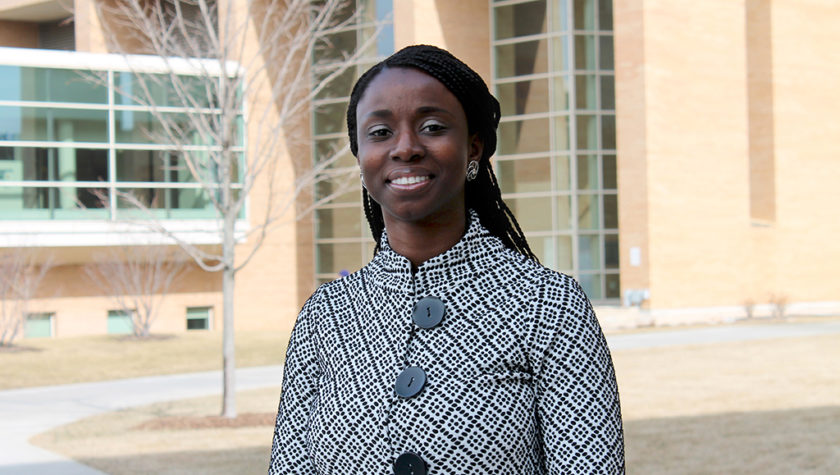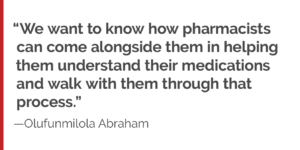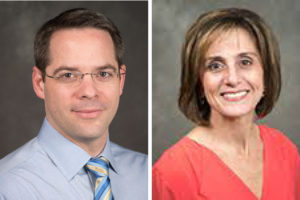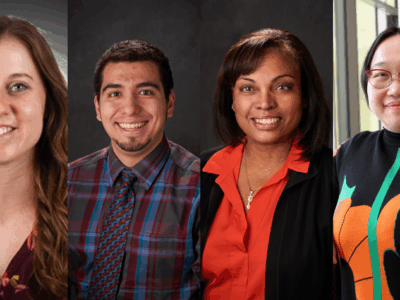
7
March

Assistant Professor Olufunmilola Abraham’s partnership with UW Health Cystic Fibrosis Clinic wins Fall Research Competition award
By Katie Gerhards
Graduating high school is more than an educational milestone; it also ushers in a new era of possibilities, offering young adults the chance to pursue their dreams and enjoy independence. But that independence also comes with new responsibilities. For adolescent patients with cystic fibrosis, increasing independence often means navigating their complex and time-consuming medication regimens alone, which leads to lower medication adherence — and steep consequences.
“The transition to college is extremely challenging,” says Olufunmilola Abraham (MS ’11, PhD ’13) assistant professor in the University of Wisconsin–Madison School of Pharmacy’s Social and Administrative Sciences Division. “Patients with cystic fibrosis often end up in the hospital during this time because they’re missing medications. These aren’t simple medications that you can be off of for one day — missing them is really life threatening.”
Cystic fibrosis patients need to take eight to 10 medications per day, and it can take up to three hours to complete the full regimen. In addition to health risks, the missed medications also carry a financial consequence, both through potential hospital bills and through the costs of the medications themselves, which can have a co-pay of up to $300 per month.
With collaborators in the UW Health Cystic Fibrosis Clinic, Abraham won a UW–Madison Fall Research Competition award to identify ways to leverage pharmacists to help young adults with cystic fibrosis self-manage and adhere to their medications.
Over the next year, Abraham and her team, with the assistance of students in the School’s PharmD program and Social and Administrative Sciences in Pharmacy graduate program, will be interviewing patients and members of the cystic fibrosis health care team about barriers to self-managing medications, how pharmacists can help address those challenges, and how patients prefer to interact with pharmacists.
“We’re proposing to humble ourselves and listen to these patients to see where they’re struggling,” says Abraham. “We want to know how pharmacists can come alongside them in helping them understand their medications and walk with them through that process.”
The need for pharmacists
More than 30,000 people in the U.S. are living with cystic fibrosis, which is one of the most common and complex life-shortening inherited diseases. Essentially, a glandular defect causes the production of abnormally thick mucus that plugs up ducts and passageways, primarily in the lungs and digestive system.

Among adolescents, adherence to airway clearance methods are as low as 40 percent, and nutritional recommendations as low as 16 percent, according to Abraham’s article “The Pharmacist’s Role in Supporting People Living with Cystic Fibrosis,” published in the Journal of the American Pharmacists Association.
“What typically happens is that early in life, their parents are managing a lot of the medications, and then when they get to adolescence, they struggle to manage it on their own,” says Abraham, which leading to increased mortality.
Because parents are often — if not always — the ones picking up the medications from the pharmacy, young patients might not even recognize that pharmacists are a valuable resource who can help with anything from patient education to therapeutic drug monitoring, or even helping patients work with physicians to design a medication routine that works with their lifestyle.
Impacting patient outcomes
The Fall Research Competition-funded project, “Identifying Interventions to Improve Medication Self-Management and Pharmacy Services for Young Adults Living with Cystic Fibrosis,” is the UW Health Cystic Fibrosis Clinic’s first opportunity to collaborate with the School’s Social and Administrative Sciences Division as a resource to do the research to show which interventions make sense.

“The role of the pharmacist in cystic fibrosis care is key to optimizing the health of our patients,” says Andrew Braun, director of the UW Health Adult Cystic Fibrosis Clinic. “These efforts to define the role that a pharmacist can play in promoting adherence to therapies can have valuable impact in the long-term health of our patients, and Dr. Abraham has a passion and energy for this collaborative effort.”
He has been working with Abraham and Cystic Fibrosis Clinic pharmacist Catherine Decker (PharmD ’94) to devise a strategy to integrate this research effort into their multidisciplinary practice, says Braun. “Fortunately, individuals with cystic fibrosis frequently participate in clinical research and we expect interest to be quite high.”
With higher participation, the researchers will have deeper insight into the issues hindering adherence and will therefore be more equipped to leverage pharmacists at the right pain points to enable greater longevity and quality of life.
“We want to hear the voice of the patient to know how the pharmacist can be a true partner in their medication management process,” says Abraham.
Learn more about another of Dr. Abraham’s youth-focused initiatives: building a video game to teach teenagers about opioid medication safety.




